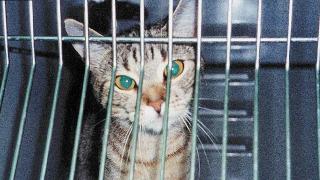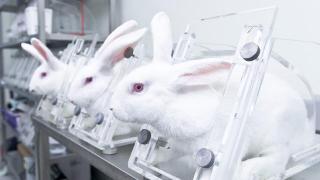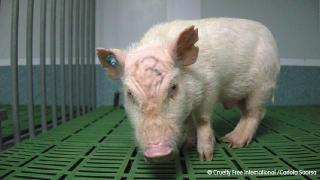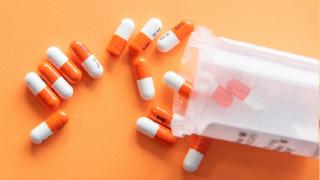Animal experiments are cruel, unreliable, and even dangerous
The harmful use of animals in experiments is not only cruel but also often ineffective. Animals do not naturally get many of the diseases that humans do, such as major types of heart disease, many types of cancer, HIV, Parkinson’s disease or schizophrenia. Instead, signs of these diseases are artificially induced in animals in laboratories in an attempt to mimic the human disease. Yet, such experiments belittle the complexity of human conditions which are affected by wide-ranging variables such as genetics, socio-economic factors, deeply-rooted psychological issues and different personal experiences.
It is not surprising to find that treatments showing “promise” in animals rarely work in humans. Not only are time, money and animals’ lives being wasted (with a huge amount of suffering), but effective treatments are being mistakenly discarded and harmful treatments are getting through. The support for animal testing is based largely on anecdote and is not backed up, we believe, by the scientific evidence that is out there.
Despite many decades of studying cancer, Alzheimer’s disease, Parkinson’s disease, diabetes, stroke and AIDS in animals, none of these conditions have reliable and fully effective cures and some don’t even have effective treatments.
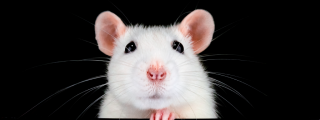
The history of cancer research has been the history of curing cancer in the mouse. We have cured mice of cancer for decades and it simply didn’t work in human beings.
Unreliable animal testing
- 92% of drugs fail in human clinical trials despite appearing safe and effective in animal tests, often on safety grounds or because they do not work.
- Urology drugs have the lowest success rate (only 4% are approved after entering clinical trials) followed by heart drugs (5% success rate), cancer drugs (5% success rate) and neurology drugs (6% success rate).
- Our research has shown that using dogs, rats, mice and rabbits to test whether or not a drug will be safe for humans provides statistically little useful insight. Our study also revealed that drug tests on monkeys are just as poor as those using any other species in predicting the effects on humans.
- A recent study found that out of 93 dangerous drug side effects, only 19% could have been predicted by animal tests.
- Another study showed that over 1,000 potential stroke treatments have been “successful” in animal tests, but of the approximately 10% that progressed to human trials, none worked sufficiently well in humans.
- One review of 101 high impact discoveries based on basic animal experiments found that only 5% resulted in approved treatments within 20 years. More recently, we conducted an analysis of 27 key animal-based ‘breakthroughs’ that had been reported by the UK press 25 years earlier. Mirroring the earlier study, we found only one of the 27 “breakthroughs” had been realised in humans, and that was subject to several caveats.
Dangerous animal testing
- Vioxx, a drug used to treat arthritis, was found to be safe when tested in monkeys (and five other animal species) but has been estimated to have caused around 140,000 heart attacks and strokes and 60,000 deaths worldwide.
- Human volunteers testing a new monoclonal antibody treatment (TGN1412) at Northwick Park Hospital, UK, in 2006 suffered a severe immune reaction and nearly died. Testing on monkeys at 500 times the dose given to the volunteers totally failed to predict the dangerous side effects.
- A drug trial in France resulted in the death of one volunteer and left four others severely brain damaged in 2016. The drug, which was intended to treat a wide range of conditions including anxiety and Parkinson’s disease, was tested in four different species of animals (mice, rats, dogs and monkeys) before being given to humans.
- A clinical trial of Hepatitis B drug fialuridine had to be stopped because it caused severe liver damage in seven patients, five of whom died. It had been tested on animals first.
Animals are different
- Animals do not get many of the diseases we do, such as Parkinson’s disease, major types of heart disease, many types of cancer, Alzheimer’s disease, HIV or schizophrenia.
- An analysis of over 100 mouse cell types found that only 50% of the DNA responsible for regulating genes in mice could be matched with human DNA.
- The most commonly used species of monkey to test drug safety (Cynomolgous macaque monkeys) is resistant to doses of paracetamol (acetaminophen) that would be deadly in humans.
- Chocolate, grapes, raisins, avocados and macadamia nuts are harmless in humans but toxic to dogs.
- Aspirin is toxic to many animals and would not be on our pharmacy shelves if it had been tested according to current animal testing standards.
The science relating to animal experiments can be extremely complicated and views often differ. What appears on this website represents Cruelty Free International expert opinion, based on a thorough assessment of the evidence.
FIND OUT MORE ABOUT ANIMAL TESTING
Our History
subtitle: Established in 1898, Cruelty Free International is firmly rooted in the early social justice movement and has a long and inspiring history.
Facts and figures on animal testing
subtitle: Millions of animals are used and killed in the name of progress every year.
What is animal testing?
subtitle: Animals used in laboratories are deliberately harmed, not for their own good, and are usually killed at the end of the experiment.
Alternatives to animal testing
subtitle: Alternatives to animal tests are often cheaper, quicker and more effective.
Types of animal testing
subtitle: Animal testing is carried out in a wide range of areas, including biological research, and testing medicines and chemicals.


